 |
Public Policy
Monthly Mailer |
|
| October 2024 |
Vol 6, Issue 9 |
|
 |
| Global CBPR | Technical Workshop on the Global Cross Border Privacy Rules Forum |
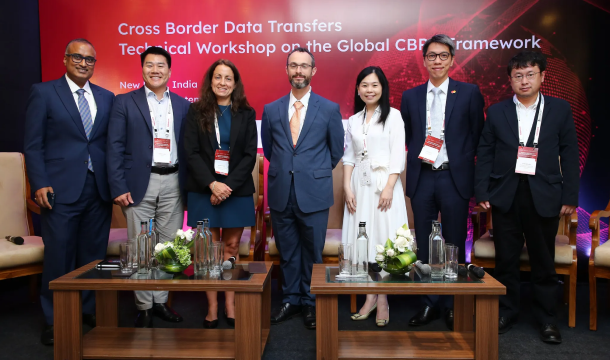 |
|
|
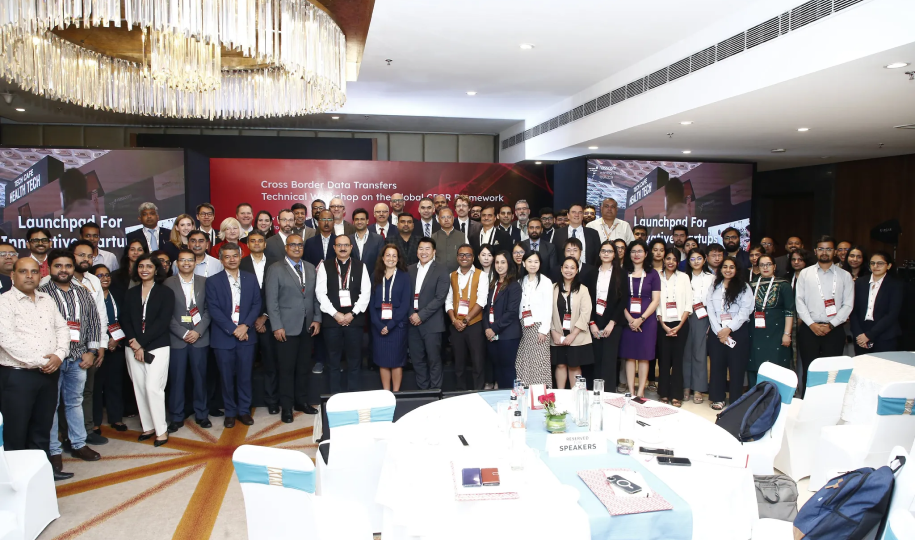 |
| nasscom and DSCI, in collaboration with MEITY and MEA, convened a technical workshop from 19-21 September, 2024 to examine the Global CBPR framework and its relevance for India. The CBPR framework aims to establish a certification-based system for both, data controllers/fiduciaries and processors, enabling cross-border personal data transfers between member countries to ensure privacy and security of personal information. This framework, based on the earlier APEC CBPR system, is set to be operationalised later this year. The CBPR Forum has also launched a multilateral enforcement arrangement called the Global Cooperation Arrangement for Privacy Enforcement (Global CAPE) to facilitate cooperation on data protection and privacy enforcement between participating countries. |
| Highlights |
| As India prepares to operationalise the DPDPA, the workshop examined the value proposition of the CBPR framework as a tool for compliance with domestic data protection laws in the context of international data transfers. Experts from India, Brazil, USA, UK, Japan, Singapore, Philippines, Mexico, Chinese Taipei (Taiwan), and Nepal, convened in Delhi to share their experiences with implementation and motivations for adoption of the framework. |
| The three-day workshop explored how the CBPR framework could enhance trusted cross-border transfers of personal data and support digital trade globally. Indian government departments, agencies and regulators, including MEITY, MEA, Department of Commerce, MHA, RBI, SEBI, PFRDA, IFSCA, NPCI, and ONDC, participated in the discussions. |
| Recent developments in PETs and their potential impact on cross-border data transfers were discussed. Singapore shared its experience of running a PET regulatory sandbox, providing valuable insights into practical implementation and regulatory considerations in this context. The workshop also examined the implications of cross-border data protection on the responsible use of AI. |
| Looking Ahead |
| nasscom and DSCI will publish a comprehensive post-event report detailing the discussions and outcomes of the workshop. Moving forward, we will continue to work closely with industry stakeholders, government bodies, and the CBPR Forum to assess the way forward for India. |
|
 |
| MEITY | Representation on Proposed Building Code for Data Centres |
| Pursuant to a query from MEITY, we submitted feedback on what the ideal floor-to-ceiling height under the proposed Building Code for DCs should be. Earlier this year in February 2024, we submitted detailed feedback on this subject matter. On the basis of industry inputs, unique infrastructural requirements of DCs, and functioning DC policies in states like Uttar Pradesh and Karnataka, we suggested that there should be no restrictions on the floor-to-ceiling height. However, should the government consider prescription of a limit, we suggested that as per current industry practices, a floor-to-ceiling height of upto 9.5 metres may be considered. |
| NTIPRIT | National Digital Communications Policy |
 |
| We submitted preliminary inputs on the proposed NDCP. In our submission, we stated that the market has changed with the use of technologies across different industries and value chains. We acknowledged that while NDCP 2018 recognised the rapid proliferation of data consumption at an individual level, India has since experienced a surge in enterprise-level data traffic due to inter-data center connectivity. |
| Given these developments, our inputs highlighted the importance of adapting the policy to meet future demands by establishing appropriate benchmarks to ensure uninterrupted connectivity, enhanced service quality, minimal latency and high data volume availability. |
| Our suggestions under each of the proposed relevant objectives of the proposed NDCP included expanding infrastructure encouragement to dark fibre, captive use authorisation and IP-PSTN switching; promoting regulatory clarity for start-ups and MSMEs by including HCCPs and Audiotex; incorporating IXPs and CDNs for emerging technologies; enabling nationwide internet telephony licensing; and delicensing 6GHz for efficient spectrum utilisation. (Read more) |
| GST | Implementation of Invoice Management System (IMS) |
We have made a submission to GSTN and the GST policy wing highlighting certain issues with the IMS. Our submission highlighted the following key issues:
1. IMS is not optional as envisaged, since action taken at recipient's end may impact supplier reporting.
2. There is no pilot period provided for user-testing and implementation of IMS.
3. The absence of an “edit” option on IMS and a “pending” option for credit notes.
4. The lack of clarity on interest exposure in the hands of supplier, amongst others. |
| We requested for clarification on these issues and resolution of ambiguities regarding the implementation of IMS. Once clarity is provided, we suggested that reasonable time be provided for industry to incorporate changes in ERP or accounting software. Specifically, a request has been made to extend the implementation deadline for IMS by at least 6 months, proposing a new implementation date of April 1, 2025. (Read more) |
| RBI | Draft Framework on Alternate Authentication Mechanisms for Digital Payment Transactions |
| We made a submission in response to the RBI’s public consultation on the draft framework, highlighting three key considerations. The aim of the proposed draft framework is to enable the payments ecosystem to adopt alternative authentication mechanisms and widen the choice of authentication factors available to payment system operators and users. Our inputs were related to the interpretation of dynamically created AFA technology and its alignment with industry best practices. The potential unintended consequences of proposed principles for customer consent and deregistration options were also highlighted, requesting the RBI to revisit these. Additional time was also requested for small players to implement the draft framework requirements, beyond the currently proposed three months. (Read more) |
|
| Odisha Government | Labour and employment |
| We submitted a representation to the government of Odisha highlighting certain ease of doing business concerns faced by IT/ITeS organisations operating in the state. Our endeavour is to develop consistent collaboration with the state government to build a bespoke regulatory approach that is flexible and adaptive to suit sectoral needs and aspirations. |
|
|
|
 |
| UP Government | Meeting on GCC Policy |
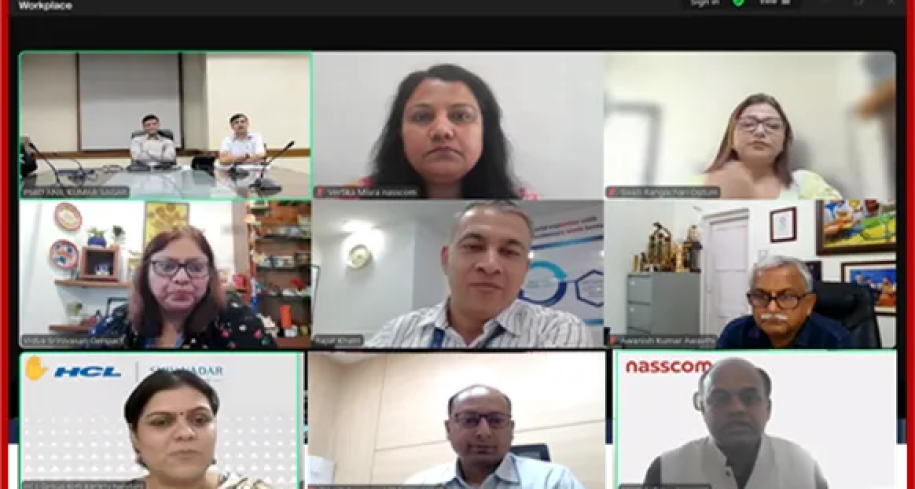 |
| A meeting with Principal Secretary, UP was held on September 27, 2024, to discuss the upcoming GCC policy of the state. A presentation on the key features of the policy, including fiscal incentives, was made. We presented our views on the definition of GCC, time bound approvals and the creation of an advisory council with representatives from industry and government. The points we highlighted were well received by the government officials. |
| Delhi Government | Meeting on challenges in compliance with EV mandates |
| We met virtually with the Commissioner of Transport, Delhi on September 7, 2024, along with an industry delegation, to present the challenges faced by the industry in complying with certain provisions of the Delhi Motor Vehicle Aggregator and Delivery Service Provider Scheme, 2023. We highlighted technical issues encountered while using the portal for onboarding fleet details, efforts undertaken by the industry to procure relevant documentation, and supply constraints for electric vehicles in Delhi, along with their impact on implementing the Scheme's mandates. After the meeting, Delhi transport department requested the industry to provide data on projected electrification trends for their fleets. |
| TRAI | TCCCPR |
| We had a meeting with TRAI on the issue of TCCCPR to discuss legitimate industry concerns regarding the latest TRAI direction on disconnection of telecom resources and its impact on business continuity for critical emergency services. While TCCCPR and TRAI’s latest direction are much needed steps towards the broader aim of curbing unsolicited commercial communications and improving customer experience, we requested TRAI to allow ‘incoming calls’ for customer support including critical, and emergency services while concerned enterprises are in the process of entirely migrating to 140 series. |
|
 |
| MOF | Call for Inputs: Pre-Budget Memorandum 2025-26 |
| We have started the process of preparing nasscom's Pre-Budget Memorandum 2025-26 (PBM) to be submitted to the Ministry of Finance. Based on our last submission, we plan to structure this year’s PBM to suggest measures to boost the Indian economy and to sustain global competitiveness of the Indian IT-BPM sector. The aim is to create a balanced approach that not only fosters economic growth but also ensures that the tech sector, a significant contributor to India's economy, remains at the forefront of global competition. Please share your inputs and suggestions before October 7, 2024, to tejasvi@nasscom.in. (Read more) |
|
| MOF | Call for Inputs: Review of Income Tax Act, 1961 |
| In the Budget 2024, the finance minister announced the undertaking of a comprehensive review of the Income Tax Act, 1961 (IT Act). The aim is to streamline the Act, making it more concise, clear, and user-friendly. The ultimate goals are to reduce tax-related disputes, minimise litigation, and provide greater tax certainty for taxpayers. In this regard, MOF has invited suggestions for simplification of the language of IT Act; and suggestions for mitigating litigation, providing tax certainty, bringing down the tax demand involved in litigation and reducing the compliance burden. Please share your inputs on specific sections of the Act along with suggestions and rationale with tejasvi@nasscom.in. before October 7, 2024. |
|
|
|
 |
| DGFT | Import Licence Restrictions |
| Last year, DGFT had introduced restrictions on import of laptops, tablets, all-in-one personal computers, and ultra small form factor computers and servers. Based on nasscom's feedback, DGFT allowed multiple authorisations with validity up to September 30, 2024. Recently, nasscom submitted another representation to DGFT stating that in the absence of any policy, the authorisation needs to be further extended. On September 24, 2024 DGFT issued a notification stating that import authorisation is extended up to December 31, 2024. From January 1, 2025 onwards, fresh authorisation is to be provided based on the detailed guidelines to be issued. We will now be working with MEITY on these detailed guidelines. In case you have any suggestions on this issue, please write to vertika@nasscom.in. |
| GST Council | 54th GST Council Meeting |
| The recent announcements by the GST Council mark a significant step forward in enhancing ease of doing business for the IT-BPM and e-commerce sectors in India. The Council has issued a circular to clarify the place of supply for data hosting services provided by service providers located in India to cloud computing service providers located outside India. The rolling out of B2C e-invoicing on a voluntary basis is also a welcome move. (Read more) |
We have been advocating for these issues for over a year, highlighting the challenges faced by companies. We are encouraged to see our efforts culminate into positive clarifications for the industry. Other updates from the meeting include:
1. Circular to be issued to provide clarification regarding availability of input tax credit on demo vehicles by the dealers of the vehicle manufacturers.
2. IMS and new ledgers to allow the taxpayers to accept, reject, or to keep the invoices pending for the purpose of availing input tax credit.
3. Procedure and conditions for waiver of interest or penalty or both, in respect of tax demands under S. 73 of CGST Act, 2017 for FYs 2017-18, 2018-19 and 2019-20 as per S. 128A of CGST Act, 2017.
4. Provision of a mechanism for implementation of newly inserted sub-section (5) and sub-section (6) in section 16 of CGST Act, 2017.
5. Amendments in rule 89 and rule 96 of CGST Rules and to provide clarification in respect of IGST refunds on exports where benefit of concessional/ exemption notifications specified under rule 96(10) of CGST Rules has been availed on the inputs. (Read more) |
| TRAI | Framework for Service Authorisations to be Granted Under the Telecommunications Act, 2023 |
| TRAI issued a Consultation Paper on this subject in July 2024. In our feedback, we highlighted the need for rationalising the existing regulatory frameworks with respect to dark fiber, HCCPs, audiotex, IXPs, CDNs, nationwide internet telephony license, and allowing captive use authorisation for enterprises. Further, in our counter comments we stated that OTTs are not under the ambit of Telecommunications Act 2023 and hence should not be brought under service authorisation. |
| TRAI has released the recommendations on September 18, 2024. In line with the Telecommunications Act which excludes OTTs, which was also re-emphasised by nasscom in its suggestions, TRAI has not recommended inclusion of OTTs under any authorisation. Also, TRAI has moved from licensing to Authorisation for Audiotex services and has also included HCCSPs under the same. Our recommendation on this issue included expanding the Audio Conferencing/Audiotex/Voice Mail service authorisation to include cloud-based EPABX services. We suggested renaming this authorisation to "Enterprise Communication Service Authorization" and categorising this authorisation under Auxiliary Service authorisations. (Read more) |
| Membership Initiative | nasscom IP Enablement Program |
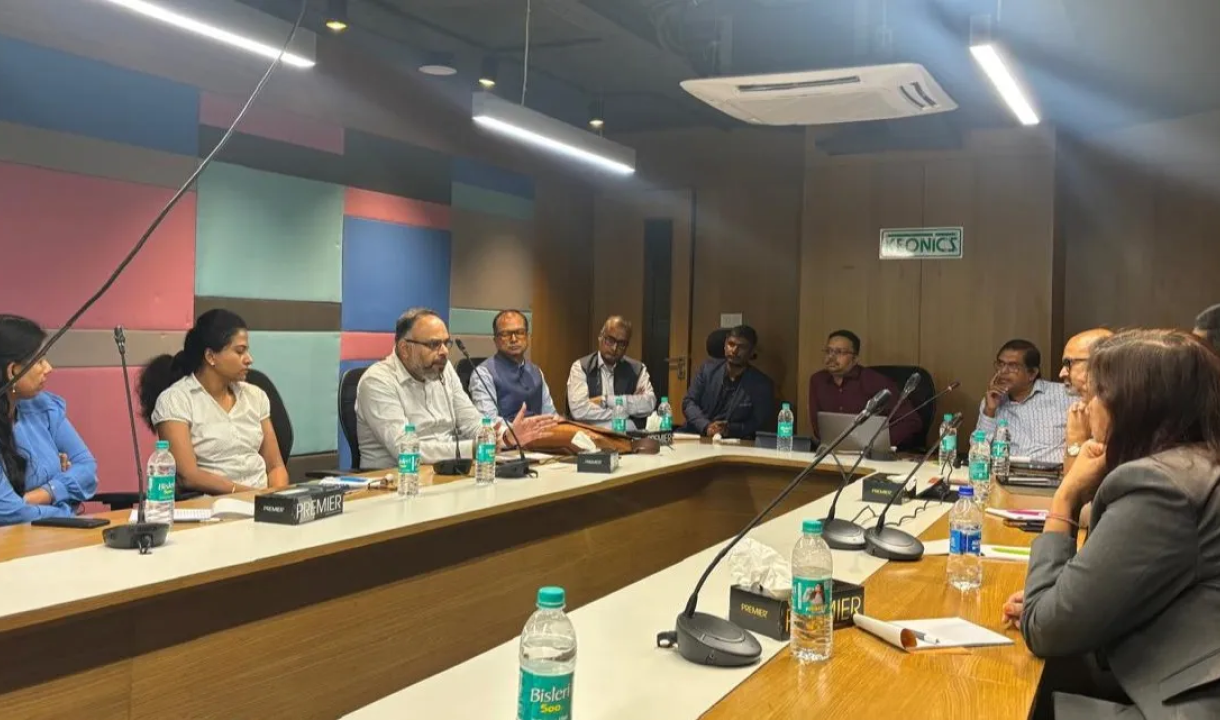 |
| The program is a strategic initiative aimed at creating a strengthened intellectual property (IP) ecosystem in the country via collaborative efforts and initiatives involving government, academia, startups, and industry. The goal is to nurture and expand the existing IP base in India, aiming for a threefold increase in the next five years. |
| In this context, the IP Thinktank meeting was held on September 26, 2024 in Bengaluru, to plan the program's charter by bringing together innovation leaders and IP experts from the technology, law, and business sectors. Ashish Aggarwal contributed strategic policy insights to the discussion which highlighted the need to cultivate IP awareness across diverse sectors and provided practical insights on boosting collaboration between academia, industry, and startups. Participants also highlighted the need for streamlined and standardised frameworks to enhance synergy for innovation, a robust top-down approach to address IP challenges and a focus on specialised strategies for India's unique landscape. |
| APEC |
Asia Pacific Economic Cooperation |
| AFA |
Alternate Factor of Authentication |
| CBPR |
Cross Border Privacy Rules |
| CBPR |
Cross Border Privacy Rules |
| CDN |
Content Delivery Network |
| DC |
Data Center |
| DGFT |
Directorate General of Foreign Trade |
| DPDPA |
Digital Personal Data Protection Act, 2023 (India) |
| DSCI |
Data Security Council of India |
| DGFT |
Directorate General of Foreign Trade |
| ERP |
Enterprise Resource Planning |
| GCC |
Global Capacity Center |
| GST |
Goods and Services Tax |
| GSTN |
Goods and Services Tax Network |
| HCCSP |
Hosted Contact Center Service Providers |
| IFSCA |
International Financial Services Centres Authority |
| IMS |
Invoice Management System |
| IP-PSTN |
Internet Protocol - Public Switched Telephone Network |
| IXP |
Internet Exchange Point |
| MEA |
Ministry of External Affairs |
| MEITY |
Ministry of Electronics and Information Technology |
| MHA |
Ministry of Home Affairs |
| MSME |
Micro Small and Medium Enterprise |
| NDCP |
National Digital Communications Policy |
| NPCI |
National Payments Corporation of India |
| NTIPRIT |
National Telecommunications Insitute for Policy, Research, Innovation and Training |
| ONDC |
Open Network for Digital Commerce |
| PET |
Privacy Enhancing Technologies |
| PFRDA |
Pension Fund Regulatory and Development Authority |
| RBI |
Reserve Bank of India |
| SEBI |
Securities and Exchange Board of India |
| TCCCPR |
Telecom Commercial Communications Customer Preference Regulations 2018 |
|
|
| www.nasscom.in |
    |



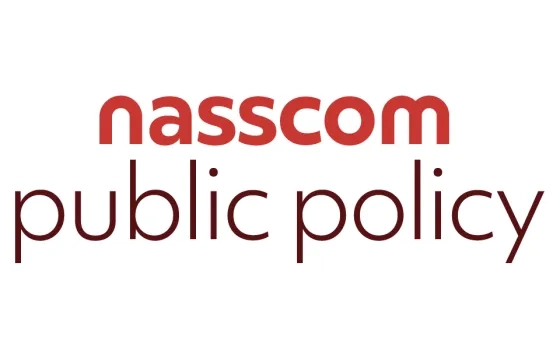




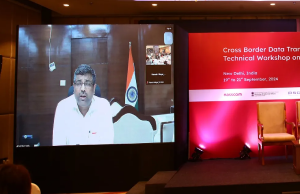
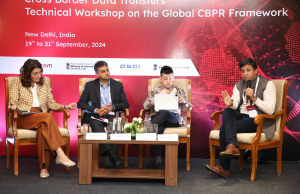












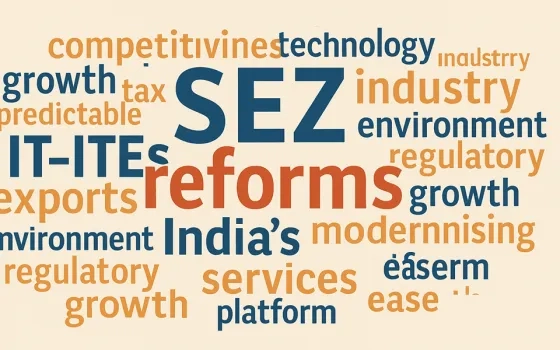


![[UPDATE] Release of Guidelines for Examination of Computer-related Inventions (CRIs), 2025](https://community.nasscom.in/sites/default/files/styles/560_x_350/public/media/images/For%20Blog%20-nasscom%20public%20policy%20960%20x%20600%20png_14.png.webp?itok=TVoaAkX5)
